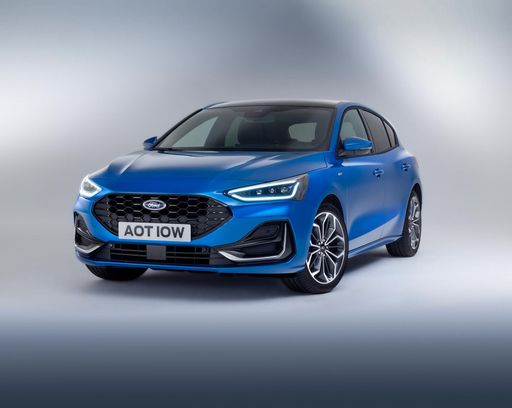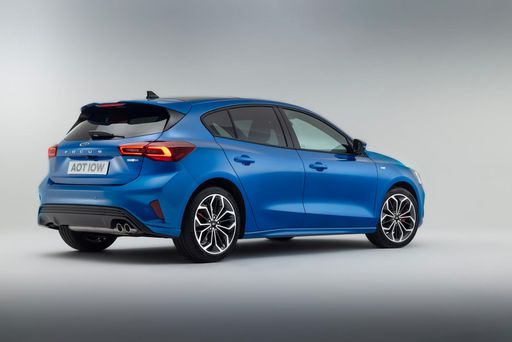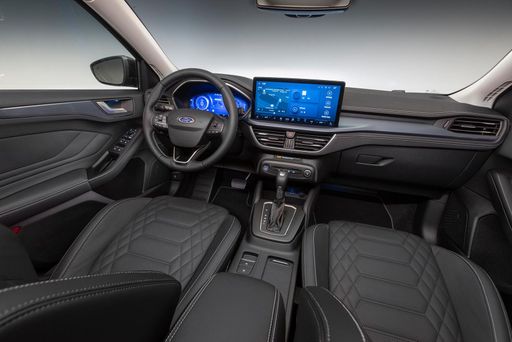Ford Focus vs Toyota C-HR - Differences and prices compared
Compare performance (280 HP vs 223 HP), boot space and price (27500 £ vs 29100 £ ) at a glance. Find out which car is the better choice for you – Ford Focus or Toyota C-HR?
Costs and Efficiency:
Looking at overall running costs, both models reveal some interesting differences in everyday economy.
Ford Focus has a barely noticeable advantage in terms of price – it starts at 27500 £ , while the Toyota C-HR costs 29100 £ . That’s a price difference of around 1620 £.
Fuel consumption also shows a difference: Toyota C-HR manages with 0.80 L and is therefore significantly more efficient than the Ford Focus with 4.90 L. The difference is about 4.10 L per 100 km.
Engine and Performance:
Power, torque and acceleration say a lot about how a car feels on the road. This is where you see which model delivers more driving dynamics.
When it comes to engine power, the Ford Focus has a noticeable edge – offering 280 HP compared to 223 HP. That’s roughly 57 HP more horsepower.
In acceleration from 0 to 100 km/h, the Ford Focus is noticeable quicker – completing the sprint in 5.70 s, while the Toyota C-HR takes 7.40 s. That’s about 1.70 s faster.
In terms of top speed, the Ford Focus performs distinct better – reaching 250 km/h, while the Toyota C-HR tops out at 180 km/h. The difference is around 70 km/h.
Space and Everyday Use:
Beyond pure performance, interior space and usability matter most in daily life. This is where you see which car is more practical and versatile.
Both vehicles offer seating for 5 people.
In curb weight, Ford Focus is slightly lighter – 1330 kg compared to 1505 kg. The difference is around 175 kg.
In terms of boot space, the Toyota C-HR offers a bit more room – 447 L compared to 392 L. That’s a difference of about 55 L.
In maximum load capacity, the Ford Focus performs a bit better – up to 1354 L, which is about 199 L more than the Toyota C-HR.
When it comes to payload, Ford Focus clearly perceptible takes the win – 560 kg compared to 425 kg. That’s a difference of about 135 kg.
Who wins the race in the data check?
The Toyota C-HR is clearly superior overall in the objective data comparison.
This result only shows which model scores more points on paper – not which of the two cars feels right for you.
Costs and Consumption
View detailed analysis
Engine and Performance
View detailed analysis
Dimensions and Body
View detailed analysis

Toyota C-HR
Ford Focus
The Ford Focus remains a clever all‑rounder that balances sharp handling with everyday comfort, making it a strong choice whether your commute is city streets or country lanes. Its practical cabin and sensible running costs mean you’ll spend more time enjoying the drive and less time worrying about ownership, with a playful streak underfoot that keeps things interesting.
details


Toyota C-HR
The Toyota C-HR cuts a striking figure with its angular styling and coupe-like profile, so you’ll never go unnoticed in the supermarket car park. It balances everyday practicality with a nimble, city-friendly personality, making routine commutes feel a touch more fun without asking for forgiveness.
details




Costs and Consumption |
|
|---|---|
|
Price
27500 - 42700 £
|
Price
29100 - 42800 £
|
|
Consumption L/100km
4.9 - 8 L
|
Consumption L/100km
0.8 - 5.1 L
|
|
Consumption kWh/100km
-
|
Consumption kWh/100km
-
|
|
Electric Range
-
|
Electric Range
68 km
|
|
Battery Capacity
-
|
Battery Capacity
-
|
|
co2
117 - 183 g/km
|
co2
17 - 115 g/km
|
|
Fuel tank capacity
52 L
|
Fuel tank capacity
43 L
|
Dimensions and Body |
|
|---|---|
|
Body Type
Hatchback
|
Body Type
SUV
|
|
Seats
5
|
Seats
5
|
|
Doors
5
|
Doors
5
|
|
Curb weight
1330 - 1529 kg
|
Curb weight
1505 - 1755 kg
|
|
Trunk capacity
392 L
|
Trunk capacity
350 - 447 L
|
|
Length
4382 - 4397 mm
|
Length
4362 mm
|
|
Width
1825 - 1844 mm
|
Width
1832 mm
|
|
Height
1438 - 1482 mm
|
Height
1558 - 1564 mm
|
|
Max trunk capacity
1354 L
|
Max trunk capacity
1076 - 1155 L
|
|
Payload
495 - 560 kg
|
Payload
375 - 425 kg
|
Engine and Performance |
|
|---|---|
|
Engine Type
Petrol MHEV, Diesel, Petrol
|
Engine Type
Full Hybrid, Plugin Hybrid
|
|
Transmission
Manuel, Automatic
|
Transmission
Automatic
|
|
Transmission Detail
Manual Gearbox, Dual-Clutch Automatic, Automatic Gearbox
|
Transmission Detail
CVT
|
|
Drive Type
Front-Wheel Drive
|
Drive Type
Front-Wheel Drive, All-Wheel Drive
|
|
Power HP
115 - 280 HP
|
Power HP
140 - 223 HP
|
|
Acceleration 0-100km/h
5.7 - 11.8 s
|
Acceleration 0-100km/h
7.4 - 9.9 s
|
|
Max Speed
186 - 250 km/h
|
Max Speed
175 - 180 km/h
|
|
Torque
170 - 420 Nm
|
Torque
-
|
|
Number of Cylinders
3 - 4
|
Number of Cylinders
4
|
|
Power kW
85 - 206 kW
|
Power kW
103 - 164 kW
|
|
Engine capacity
999 - 2261 cm3
|
Engine capacity
1798 - 1987 cm3
|
General |
|
|---|---|
|
Model Year
2022 - 2024
|
Model Year
2024 - 2025
|
|
CO2 Efficiency Class
D, G
|
CO2 Efficiency Class
C, B
|
|
Brand
Ford
|
Brand
Toyota
|
What drive types are available for the Ford Focus?
Available configurations include Front-Wheel Drive.




